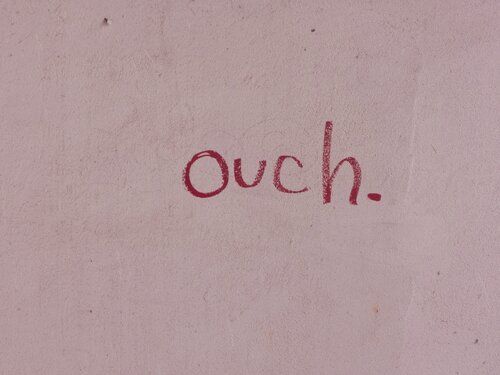Pain Trains
Is the pain in your life teaching you the wrong things?

I knew that pregnancy, labor, and delivery would be no picnic. But I didn't realize that the pains of parenting were only beginning with gestation. And every day, it's something new.
A tiny person stands abruptly, knocking me upside the chin and rattling my teeth all to hell. A stray ukulele or water bottle makes brisk contact with my temple. Often, I catch an elbow to the lactating breast (approximately like getting kicked in the balls, perhaps?)
Even my infant wants in on the action - he pulls my hair like his life depends on it and kicks me while I wrangle him into pajamas. The other day, he grazed his tiny jagged nails across my cheek and drew blood.
Now, I've been struggling to maintain composure around my children. They are just babies and do not deserve ire, regardless of how annoying or recalcitrant they become.
(Dear reader, the yelling doesn't really work anyways).
But dealing with my temper and troubleshooting its components is taking longer than I'd hoped. The first step was simply finding ways to stop yelling. That stage is complete, but there are layers yet ahead.
And so not too long ago, as I winced and considering my smarting head/boob/teeth, a quasi-tautological piece of the temper puzzle came to me:
IT'S HARD TO FEEL GOOD ABOUT THINGS THAT HURT.
When pain accompanies an activity, it's going to make that activity feel and seem worse than less painful alternatives (all things being equal).
The ridiculous frequency with which my children physically hurt me is one of the hurdles to my feeling essentially at ease around them.
The Purpose of Pain
Pain's purpose is to motivate us away from bad stuff, so we can go towards the good stuff instead. Over time, pain trains us to adopt some habits instead of others.
But like many fruits of the evolutionary process, pain is kludgy and inelegant. Things hurt that "shouldn't," but that doesn't mean we can ignore them even once we've realized. Emotional processing happens lower than the analysis.
Pain dispersed within the things we think we like is just plain confusing. How are you supposed to pursue something at the same time as it's hurting you? It can make sense rationally, but your inner animal will try to take the reins unless your neocortex manages to grab them away.
In my case, this shows up as feeling markedly not at ease around my children, even (especially!) when they physically approach me. I want to be a physically loving mom, but I'm also bracing myself for the impact. Awkward.
"Pain" doesn't have to be straightforwardly physical, either. Pains can be psychological. Anything aversive counts as "pain," in this context: nervousness, anxiety, annoyance, even an intimidating ambiguity.
Misplaced pain contributes massively to cognitive dissonance. When the wrong thing hurts, we tend to do the wrong thing in response:
- You're ostensibly a writer, but it's painful to stare at a blank screen. You watch tv instead.
- You sincerely want to cook, but your kitchen is all a mess so you order delivery instead.
- You want to get better at your job, but between your manager's criticism and your negative self-talk you can hardly stand to show up at all.
- The clutter in your apartment is driving you crazy, but you've never learned to clean and organize so they are painful to do while generating poor results. You decide just to stay away from your own home.
Meaningful Pain
There are plenty of things that do feel good despite attendant pain, but this doesn't happen automatically. Instead, in these cases, our meaning-makers have gotten a good explanation off the ground.
- Exercise sometimes hurts, but if you sincerely believe "no pain no gain" or if you can shift your attention towards the pleasures of health and beauty, you'll still work out (plus, endorphins?)
- As far as I can tell, it is very unlikely that an actively-laboring woman offered epidural analgesia will decline it... unless she holds beliefs about the inherent meaning found in birth-related pain (or if she holds empirical beliefs about the danger of such drugs). When women with those beliefs accept epidurals out of desperation, they later report guilt and regret.
Even so, the meaning-driven override of pain is a tenuous approach. Meaning-first approaches can inform deliberate behavioral restructuring, but may not reliably solve motivational problems all on their own.
Put Pain In The Right Place
I don't know how to craft a life built on intrinsic motivation only - does anyone? And plenty of my peers seem to have pet theories of when and why "incentives" matter (they do!)
But don't forget the lowest-hanging behavioral modification fruit: alleviating misplaced pains.
I am having a hard time getting my kids to stop accidentally hurting me, of course. But now I see how all these bumps and cuts are related to feeling baseline not-at-ease around my kids and isn't doing much for my temper, either. I used to think that these injuries were an inconvenience, but now I see they were inadvertently teaching me the wrong thing.
As for you: you may have much more direct control over the misplaced pains, hurdles, and costs in your own life.
If you want to spend more time at home and less at work, make home feel good. If you want to read more, read something interesting.
Speak the language of your inner animal, and you might just get it to jump through that hoop.
Pamela J. Hobart - Philosophical Life Coaching Newsletter
Join the newsletter to receive the latest updates in your inbox.